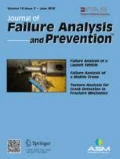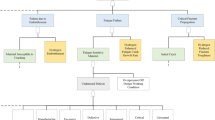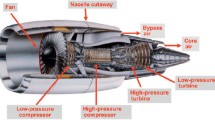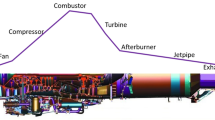Abstract
Turbine rotor is a critical and life-limiting component in gas turbine engines. The thermo-mechanical fatigue (TMF) life of a turbine rotor was studied using reliability method. The fatigue life was estimated using (a) Marrow’s model and (b) Smith–Watson–Topper model. The creep life was estimated based on Larson Miller equations and finite element analysis. The cumulative fatigue–creep damage was estimated, and the turbine rotor TMF life was estimated against the data variation. The reliability approach takes care of material property variations, load variations and geometrical variations. These variations bring out the scatter in component stress–strain and further into life. The scattered life spells out the component reliability. The TMF life was modeled as Weibull distribution, and the reliability was estimated. The component was tested for structural integrity through hot cyclic spin test, and the results were compared with the predictions. The blade growth and strain estimations using Marrow and SWT–creep methods were found in good agreement with the test values.













Similar content being viewed by others
Abbreviations
- SWT:
-
Smith–Watson–Topper method
- TMF:
-
Thermo-mechanical fatigue
- LCF:
-
Low-cycle fatigue
- HCF:
-
High-cycle fatigue
- UTS:
-
Ultimate tensile strength
- LMP:
-
Larson Miller parameter
- c :
-
Fatigue ductility exponent
- \( \sigma_{f}^{{\prime }} \) :
-
Fatigue strength coefficient
- \( \epsilon_{f}^{{\prime }} \) :
-
Fatigue ductility coefficient
- E :
-
Young’s Modulus
- ε a :
-
Total strain amplitude
- ε e :
-
Elastic strain amplitude
- ε p :
-
Plastic strain amplitude
- σ max :
-
Maximum stress
- η :
-
Weibull scale parameter
- β :
-
Weibull shape parameter
References
H. Cohen, G.F.C. Rogers, H.I.H. Saravanamuttoo, Gas Turbine Theory, vol. 5 (Wiley, New York, 2001)
B.A. Cowles, High cycle fatigue in aircraft gas turbines—an industry perspective. Int. J. Fract. 80(2–3), 147–163 (1996)
S.P. Zhu, H.Z. Huang, Y. Liu et al., An efficient life prediction methodology for low cycle fatigue-creep based on ductility exhaustion theory. Int. J. Damage Mech 22(4), 556–571 (2012)
S.P. Zhu, H.Z. Huang, P.L. He et al., A generalized energy-based fatigue–creep damage parameter for life prediction of turbine disk alloys. Eng. Fract. Mech. 90, 89–100 (2012)
S.S. Manson, G. Halford, A method of estimating high temperature low cycle fatigue behaviour of materials, in Proceedings of Int. Conference on Thermal and High Strain Fatigue (Metals and Metallurgy Trust, London, 1967), pp. 154–170
S. Majumdar, P.S. Maiya, A damage equation for creep–fatigue interaction, in Winter Annual Meeting of ASME, New York, 1976, pp. 323–336
T. Goswami, Low cycle fatigue life prediction—a new model. Int. J. Fatigue 19(2), 109–115 (1997)
S.S. Manson, G.R. Halford, M.H. Hirschberg, Creep–fatigue analysis by strain-range partitioning, in First Symposia on Design for Elevated Temperature Environment, ASME, 1971, pp. 12–28
W.J. Ostergren, A damage foundation hold time and frequency effects in elevated temperature low cycle fatigue. J. Test. Eval. 4, 327–339 (1967)
E.V. Zaretsky, R.C. Hendricks, Weibull-based design methodology for rotating structures in aircraft engines. Int. J. Rotating Mach. 9, 313–325 (2003)
Harris Jr., J.A., Engine Component Retirement for Cause Volume I—Executive Summary, AFWAL-TR-87-4069 (1987)
S.P. Zhu, S. Foletti, S. Beretta Probabilistic framework for multiaxial LCF assessment under material variability. Int. J. Fatigue (2017), Ref. JIJF 4375
Y.-L. Lee, J. Pan, RB Hathaway, M.E. Barkey, Fatigue Testing and Analysis (Theory and Practice) (Elsevier Butterworth-Heinemmann), ISBN 0-7506-7719-8
S Esakki Muthu, R.V. Prakash,A. Sakthivel, Probabilistic fatigue life assessment of a titanium centrifugal impeller for turboshaft engine application, in ASME Gas Turbine India Conference, (Hyderabad, India, 2015)
S. Dileep, S. Esakki Muthu, P. Udayanan, R.K. Mishra, Effect of fatigue damage parameter on the cumulative life of a turbine rotor under multiaxial loading. J. Fail. Anal. Prevent. 16(4), 612–621 (2016). https://doi.org/10.1007/s11668-016-0127-9
R.K. Mishra, S. Dileep, A novel methodology to estimate life of gas turbine components under multiaxial variable amplitude loading. J. Fail. Anal. Prevent. 17(4), 731–739 (2017). https://doi.org/10.1007/s11668-017-0309-0
B.A. Cowles, High cycle faigue failure in aircraft gas turbines: an industry perspective. Int. J. Fract. 80, 147–163 (1996)
W.Z. Zhuang, N.S. Swauan, Thermo mechanical fatigue like prediction: a credical review, DSTO-TR-0609
M.H. Dirikolu, A. Aktas, B. Birgoren, Statistical analysis of fracture strength of composite materials using Weibull distribution. Turk. J. Eng. Environ. Sci. 26, 45–48 (2002)
H. Endo, R. Wetherbee, N. Kaushal, Advancement in heated spin testing technologies by GT2013-94152, ASME Turbo Expo 2013, Taxes, USA
Acknowledgments
The authors acknowledge the Chief Designer of Aero Engine R&D Centre and engineers of Hindustan Aeronautics Limited, Bangalore, India, for their support and permission to publish this work.
Author information
Authors and Affiliations
Corresponding author
Rights and permissions
About this article
Cite this article
Esakki Muthu, S., Prakash, R.V., Mishra, R.K. et al. Thermo-Mechanical Fatigue Life Assessment of a Gas Turbine Rotor Through Reliability Approach. J Fail. Anal. and Preven. 18, 1361–1368 (2018). https://doi.org/10.1007/s11668-018-0531-4
Received:
Published:
Issue Date:
DOI: https://doi.org/10.1007/s11668-018-0531-4




